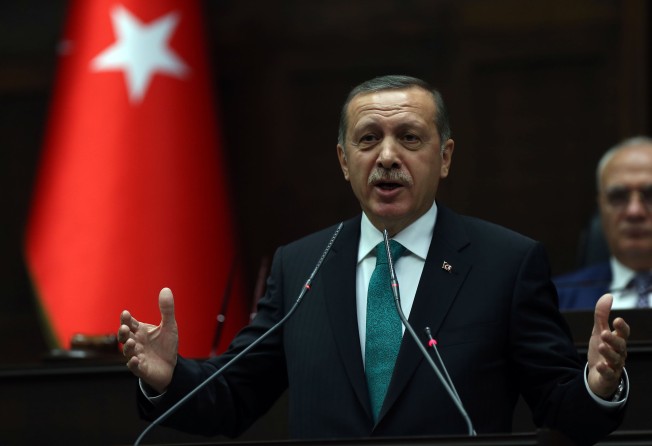Turkey crisis undermines PM’s high-profile EU visit

A high-profile Brussels visit this week by Prime Minister Recep Tayyip Erdogan, originally intended to highlight a new era in EU-Turkey ties, may instead wind up underscoring mutual tension over Ankara’s political crisis.
Erdogan flies in to EU headquarters Tuesday for a day of talks with the bloc’s top officials -- European Council president Herman Van Rompuy, European Commission president Jose Manuel Barroso and European Parliament speaker Martin Schulz.
At the heart of the talks will be Turkey’s stuttering 15-year bid to prise open the door to European Union membership, although the country’s role on the frontline of the conflict in Syria will also feature prominently.
Erdogan’s first visit to Europe’s capital in five years was to have signalled “fresh momentum” in ties after the EU in November agreed to reopen membership negotiations following a three-year freeze.
Shortly after that, in what was dubbed a “milestone” in EU-Turkish relations, Ankara agreed a pact enabling EU nations to repatriate to Turkey the thousands of migrants who slip illegally across its border into Europe.
But sharp words have flown since then due to Ankara’s move to tighten government control over its top judicial body -- the Supreme Board of Judges and Prosecutors (HSYK) -- and its purge of police and others accused of plotting Erdogan’s overthrow.
Whether or not the two can overcome differences will become apparent at a news conference the same day.
“We expect a substantial discussion” -- a diplomatic euphemism for tough talks, said an EU official who asked not to be named.
“The atmosphere is not good, the situation is worrying.”
In Ankara, analyst Marc Pierini warned that recent developments “entail a real risk of ‘political disconnect’ between Turkey and the EU, while the country has probably never been so strategically important for Europe”.
With the international community worried over strife-torn Syria and its potential for destabilising Lebanon or Jordan, and Turkey sheltering half a million refugees, analysts believe the EU will seek to maintain an even keel with Ankara.
The relationship is “reaching a critical moment,” said Carnegie Foundation’s Pierini.
Turkey’s efforts to join the EU formally started in 2005 but stalled due to several stumbling blocks including a territorial dispute with member Cyprus and opposition from heavyweights France and Germany.
EU says Erdogan must keep to accession standards
The Brussels official leading the way on Turkey’s request to join the 28-nation bloc, Enlargement Commissioner Stefan Fuele, only this week said Erdogan’s government must stick to European principles such as the respect for the rule of law in any reform of its top judicial body.
The European Parliament followed suit, warning that “an independent and impartial judiciary, based on a clear separation of powers ... is a key factor for the negotiations between Turkey and the EU”.
Turkey’s response was fiery.
Its new EU Affairs Minister Mevlut Cavusoglu, who will join the premier and the foreign and finance ministers at the talks, urged Brussels to avoid “unilateral and impatient statements”.
Erdogan’s tone was even sharper.
“It’s nobody’s job to make a statement about Turkey’s move over the HSYK,” he told his country’s ambassadors this week.
“I’m sorry but I won’t buy statements like ‘these proposals are against the EU acquis’. We know how to read and write.”
Noting that “our visit to Brussels is very important”, Erdogan said he would try to convince Brussels that his government’s actions were right and well founded.
Erdogan says his massive drive to purge police and the judiciary of civil servants conniving with a Islamic rival aims to restore the independence of government institutions.
But the mass sackings have hurt the economy and stoked severe concerns at home and abroad, with the head of the country’s business association this week warning Turkey risked becoming “a police state”.
Erdogan will “have a very difficult time in convincing his European partners in the value of his narrative,” said Sinan Ulgen, who heads Istanbul’s EDAM, or Centre for Economics and Foreign Policy Sudies.
And should he succeed in convincing them “they will nonetheless highlight the need to remain within the law to fight the threat.”